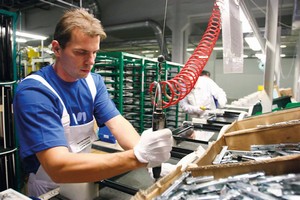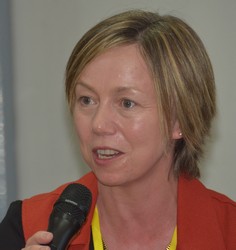The activities of our companies contribute to the protection of the environment - or rather, to its degradation? Perspectives for the next 25 years
by Lorna Gold
from "Economia di Comunione - una cultura nuova" n.43 - Editorial insert of Città Nuova no. 7 - 2016 July 2016
Global warming is a new critical context for the Economy of Communion which looks to the future. When Chiara Lubich launched the EoC in 1991, scientists and leaders were still discussing whether there was a global warming: social and economic inequality took precedence over the environment. Today the situation has changed: it has become dramatically clear that global warming is underway and all sectors of the economy and society feel the urgency of finding solutions to this problem. In his Encyclical Laudato sì Pope Francis points out that the environmental crisis is one and the same with the social and economic one: the poor and the weakest are the first ones to suffer from environmental degradation.
These issues, which all have the same root, can only be fought by confronting the logic of unsustainable consumerism dominating the current economy and culture.
Understanding this new context and its implications is not easy. Because of the systemic way in which our economy contributes to the increase in emissions by burning fossil fuels, a system-level change is needed, or as Pope Francis calls it, an "ecological conversion." The new context requires us to think carefully about how much our EoC actions contribute to the protection of the environment or its degradation. The issue of environmental problems was not in the spotlight for the first 25 years the EoC: the guidelines to running a company do contain some important suggestions about respect for the environment, but in the light of the global warming underway, they should be further developed.
Perhaps the concern for the environment is considered attributable to a specific business area, rather than a problem of all. Some good practices have already been developed, but the question of the ways in which businesses interact with their environment requires more research and training. The areas that could be explored include: the integration study of EoC businesses in the different expressions of circular economy; the nature of their procurement processes; their exposure to fossil fuels; the alignment of the core business to simplicity and measured values.
the integration study of EoC businesses in the different expressions of circular economy; the nature of their procurement processes; their exposure to fossil fuels; the alignment of the core business to simplicity and measured values.
Although we are only at the beginning, it is clear to me that the EoC has an important contribution to make in this area. According to Pope Francis, the central issue is not so much to put a "green patina" on our economy, but the need for a radical change of mentality. Taking St. Francis and his radical choice of poverty as a model, Pope Francis points out the need for practical and economic institutions that rapidly embody a new logic governed not by the pursuit of profit, but by the desire to protect our world and the poor through a judicious use of resources.
He also indicates the need for new institutions that embody an appreciation for the gift of life, a long-term thinking, a sense of a common origin and destiny, dialogue and interdisciplinarity. This logic has a striking resemblance to the one underlying the EoC culture. New and interesting perspectives for the next 25 years are opening up.








